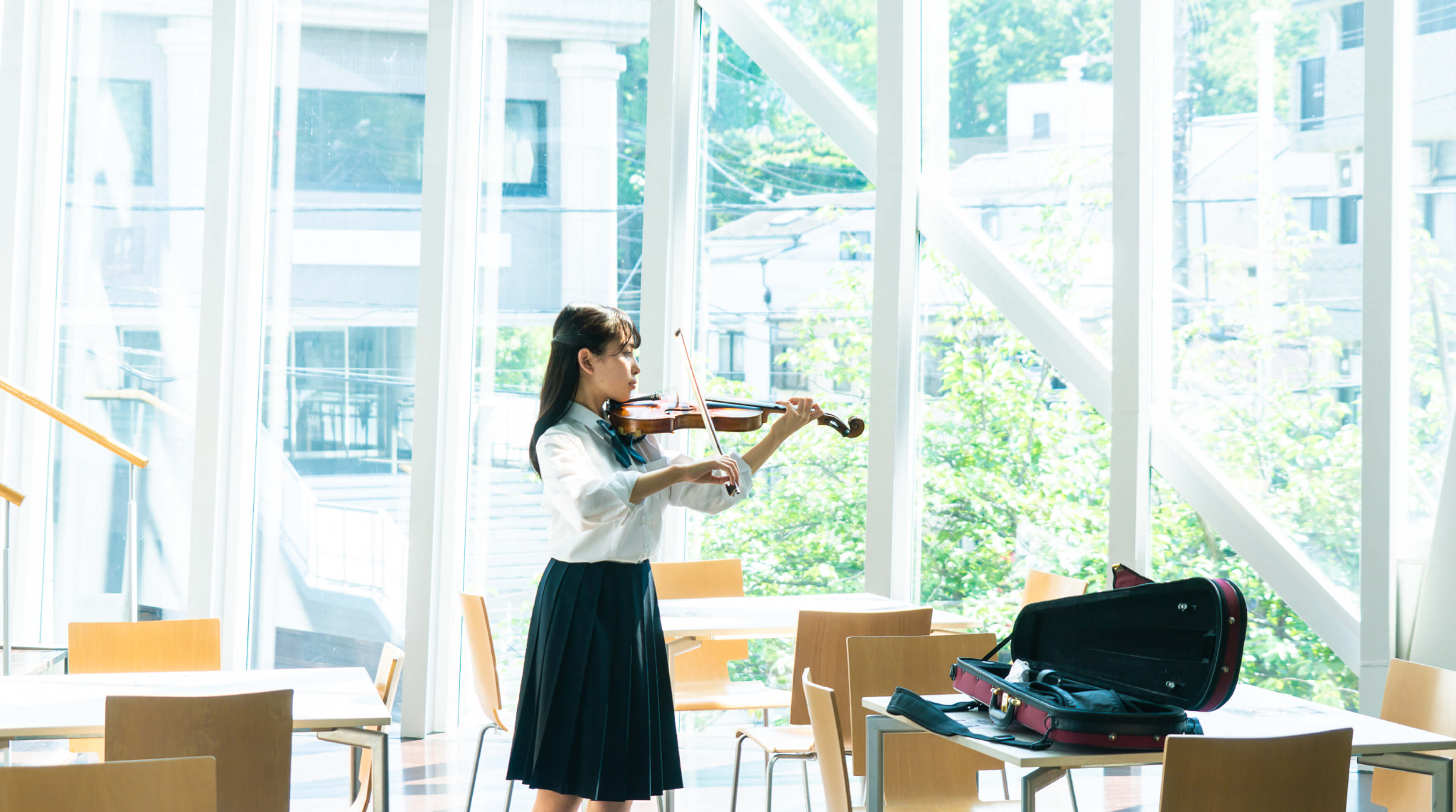Music Theory
In order to acquire a rich musicality, it is necessary to have the ability to read and feel music from scores. In the first year, students study chord symbols and singing and playing simultaneously; in the second year, students study harmony; and in the third year, students choose from several courses such as orchestration, composition, musical arrangement, musicals, and "Jazz performance.
Appreciation Studies, Music History
This course covers musical works from the Baroque, Classical, Romantic, and Modern periods. Students will learn about the characteristics of the music from each period, the changes in style, and the achievements of composers. Student appreciate music and give presentation about what they learned.
Performance Studies
In order to express oneself creatively, it is necessary to have an extensive knowledge of music as well as performance skills. In this class, we will appreciate musical works from the Baroque era to the 19th century, and focus on how musical instruments were improved and performance methods changed with changes in the social environment. We will also discuss the purpose and significance of each piece in forms of performance.
Solfège
This class is designed to develop basic musical skills. The goal is not only to develop the ability to read music, but also to acquire the ability to understand the structure and form of the score. In the first year, students are divided into melodic dictation and harmonic dictation classes, and each class is organized according to students’ abilities. 1st years will develop a sense of rhythm, beat, tonality, and harmony through rhythmic, Chorübungen, and a cappella chorus classes. 2nd and 3rd years learn them through the Sight reading classes.
Analysis
The purpose of this course is to understand the style of each composer by looking at the work objectively through analysis of motifs, harmony, form, and more, to establish your own musicality, so that you will apply it to your performance. The course will cover works from various periods from the Baroque era to the modern era.
Chorus
Students study a variety of genres, from classical a cappella with mixed voices or female voices to Romanticism, opera, and musicals. Detailed instruction is given on posture and breathing techniques for natural vocalization.
Vocal Exercises
This is a class on opera, mainly for voice majors. Studying Mozart's "The Magic Flute" and "The Marriage of Figaro", students not only sing and perform in a chorus, but also study everything that is necessary for opera, such as the appropriate way of acting each role, costume production and applying makeup.
Orchestra
This is an ensemble class for students majoring in strings, wind and percussion. Students will learn how to play in an ensemble with various instruments, understand the role of each instrument, and learn the basics of ensemble playing.
Symphonic Band
There are two classes: one is compulsory for students majoring in wind and percussion instruments, and the other is open to students of other majors. The purpose of the first class is to utilize the skills they have learned in lessons and improve their musicianship through ensembles with other parts. In the second class, which is organized for students whose majors are not wind or percussion, beginners are taught the very basic techniques of each instrument.
Chamber Music
Chamber music is divided into two categories: string chamber music and wind and percussion chamber music (including harp and classical guitar). In string chamber music, students mainly form string quartets and learn the basics of ensemble playing. Each group receives instruction from specialized instructors and learns the roles of each part in detail. In wind and percussion chamber music, students can join ensemble classes in college and learn to play in woodwind quintets or ensembles of the same instruments together with college students.
Piano Ensemble
1st year students study musical expression through piano duo (four hands). 2nd and 3rd year students can try two pianos as well. The class will be divided into several groups, with six to seven piano teachers rotating through the class.
Musical Accompaniment
The purpose of this class is to develop an ear for ensemble playing, mainly through song accompaniment. Students will study performance techniques such as breathing, phrasing, tone, and balance, as well as the role of accompaniment.
Minor in Vocal Music
This class is for third-year students, who can choose from Italian Lieder, German Lieder, Japanese Lieder, and Chorus. Each teacher sets the original syllabus, and students can learn the basics of vocal and breathing techniques.
Basic Vocal Music
Students will study vocal techniques, lyrics, melodies, stage manners, and more. They study with Concone, Italian Lieder, German Lieder etc., about singing, which is the basis of music.
Music Therapy
Through learning basic information about music therapy and experiencing related work, we will consider how music can be used for the well-being of people with various conditions, including ourselves.
